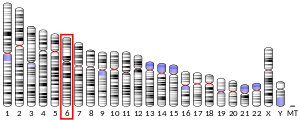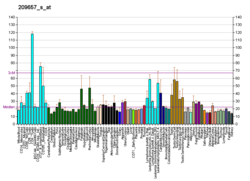HSF2
Heat shock factor protein 2 is a protein that in humans is encoded by the HSF2 gene.[5][6]
Function
HSF2, as well as the related gene HSF1, encodes a protein that binds specifically to the heat-shock element and has homology to HSFs of other species. Heat shock transcription factors activate heat-shock response genes under conditions of heat or other stresses. Although the names HSF1 and HSF2 were chosen for historical reasons, these peptides should be referred to as heat-shock transcription factors.[6]
Interactions
HSF2 has been shown to interact with Nucleoporin 62[7] and HSF1.[8]
See also
References
- GRCh38: Ensembl release 89: ENSG00000025156 - Ensembl, May 2017
- GRCm38: Ensembl release 89: ENSMUSG00000019878 - Ensembl, May 2017
- "Human PubMed Reference:". National Center for Biotechnology Information, U.S. National Library of Medicine.
- "Mouse PubMed Reference:". National Center for Biotechnology Information, U.S. National Library of Medicine.
- Schuetz TJ, Gallo GJ, Sheldon L, Tempst P, Kingston RE (Sep 1991). "Isolation of a cDNA for HSF2: evidence for two heat shock factor genes in humans". Proc Natl Acad Sci U S A. 88 (16): 6911–5. doi:10.1073/pnas.88.16.6911. PMC 52203. PMID 1871106.
- "Entrez Gene: HSF2 heat shock transcription factor 2".
- Yoshima T, Yura T, Yanagi H (Nov 1997). "The trimerization domain of human heat shock factor 2 is able to interact with nucleoporin p62". Biochem. Biophys. Res. Commun. 240 (1): 228–33. doi:10.1006/bbrc.1997.7662. PMID 9367915.
- He H, Soncin F, Grammatikakis N, Li Y, Siganou A, Gong J, Brown SA, Kingston RE, Calderwood SK (Sep 2003). "Elevated expression of heat shock factor (HSF) 2A stimulates HSF1-induced transcription during stress". J. Biol. Chem. 278 (37): 35465–75. doi:10.1074/jbc.M304663200. PMID 12813038.
Further reading
- Walsh D, Li Z, Wu Y, Nagata K (1997). "Heat shock and the role of the HSPs during neural plate induction in early mammalian CNS and brain development". Cell. Mol. Life Sci. 53 (2): 198–211. doi:10.1007/PL00000592. PMID 9118008.
- Sarge KD, Zimarino V, Holm K, Wu C, Morimoto RI (1991). "Cloning and characterization of two mouse heat shock factors with distinct inducible and constitutive DNA-binding ability". Genes Dev. 5 (10): 1902–11. doi:10.1101/gad.5.10.1902. PMID 1717345.
- Maruyama K, Sugano S (1994). "Oligo-capping: a simple method to replace the cap structure of eukaryotic mRNAs with oligoribonucleotides". Gene. 138 (1–2): 171–4. doi:10.1016/0378-1119(94)90802-8. PMID 8125298.
- Sheldon LA, Kingston RE (1993). "Hydrophobic coiled-coil domains regulate the subcellular localization of human heat shock factor 2". Genes Dev. 7 (8): 1549–58. doi:10.1101/gad.7.8.1549. PMID 8339932.
- Yoshima T, Yura T, Yanagi H (1997). "The trimerization domain of human heat shock factor 2 is able to interact with nucleoporin p62". Biochem. Biophys. Res. Commun. 240 (1): 228–33. doi:10.1006/bbrc.1997.7662. PMID 9367915.
- Suzuki Y, Yoshitomo-Nakagawa K, Maruyama K, Suyama A, Sugano S (1997). "Construction and characterization of a full length-enriched and a 5'-end-enriched cDNA library". Gene. 200 (1–2): 149–56. doi:10.1016/S0378-1119(97)00411-3. PMID 9373149.
- Yoshima T, Yura T, Yanagi H (1998). "Novel testis-specific protein that interacts with heat shock factor 2". Gene. 214 (1–2): 139–46. doi:10.1016/S0378-1119(98)00208-X. PMID 9651507.
- Hong Y, Sarge KD (1999). "Regulation of protein phosphatase 2A activity by heat shock transcription factor 2". J. Biol. Chem. 274 (19): 12967–70. doi:10.1074/jbc.274.19.12967. PMID 10224043.
- Goodson ML, Hong Y, Rogers R, Matunis MJ, Park-Sarge OK, Sarge KD (2001). "Sumo-1 modification regulates the DNA binding activity of heat shock transcription factor 2, a promyelocytic leukemia nuclear body associated transcription factor". J. Biol. Chem. 276 (21): 18513–8. doi:10.1074/jbc.M008066200. PMID 11278381.
- Nykänen P, Alastalo TP, Ahlskog J, Horelli-Kuitunen N, Pirkkala L, Sistonen L (2002). "Genomic organization and promoter analysis of the human heat shock factor 2 gene". Cell Stress Chaperones. 6 (4): 377–85. doi:10.1379/1466-1268(2001)006<0377:GOAPAO>2.0.CO;2. PMC 434421. PMID 11795475.
- He H, Soncin F, Grammatikakis N, Li Y, Siganou A, Gong J, Brown SA, Kingston RE, Calderwood SK (2003). "Elevated expression of heat shock factor (HSF) 2A stimulates HSF1-induced transcription during stress". J. Biol. Chem. 278 (37): 35465–75. doi:10.1074/jbc.M304663200. PMID 12813038.
- Alastalo TP, Hellesuo M, Sandqvist A, Hietakangas V, Kallio M, Sistonen L (2004). "Formation of nuclear stress granules involves HSF2 and coincides with the nucleolar localization of Hsp70". J. Cell Sci. 116 (Pt 17): 3557–70. doi:10.1242/jcs.00671. PMID 12865437.
- Roccisana JL, Kawanabe N, Kajiya H, Koide M, Roodman GD, Reddy SV (2004). "Functional role for heat shock factors in the transcriptional regulation of human RANK ligand gene expression in stromal/osteoblast cells". J. Biol. Chem. 279 (11): 10500–7. doi:10.1074/jbc.M303727200. PMID 14699143.
- Xing H, Wilkerson DC, Mayhew CN, Lubert EJ, Skaggs HS, Goodson ML, Hong Y, Park-Sarge OK, Sarge KD (2005). "Mechanism of hsp70i gene bookmarking". Science. 307 (5708): 421–3. doi:10.1126/science.1106478. PMID 15662014.
- Anckar J, Hietakangas V, Denessiouk K, Thiele DJ, Johnson MS, Sistonen L (2006). "Inhibition of DNA binding by differential sumoylation of heat shock factors". Mol. Cell. Biol. 26 (3): 955–64. doi:10.1128/MCB.26.3.955-964.2006. PMC 1347039. PMID 16428449.
External links
- HSF2+protein,+human at the US National Library of Medicine Medical Subject Headings (MeSH)
This article incorporates text from the United States National Library of Medicine, which is in the public domain.
This article is issued from Wikipedia. The text is licensed under Creative Commons - Attribution - Sharealike. Additional terms may apply for the media files.





